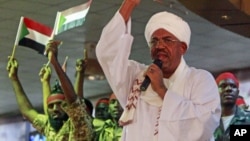NAIROBI - Malawian Vice President Khumbo Kachali said Friday the African Union will relocate an upcoming heads of state summit following his country's refusal to host war crimes suspect Sudanese President Omar al-Bashir.
Malawi's leaders have said they would have to arrest Mr. Bashir on an International Criminal Court warrant if he came to the country.
Speaking on state radio, Kachali said the country's cabinet based their decision on “what is best in the interest of Malawians.”
Malawi has previously asked the African Union not to invite Sudanese President Bashir, but the AU has said it is not up to the host country to make that decision. Kachali said the AU told him the summit will be moved to Addis Ababa, Ethiopia.
Mr. Bashir is wanted by the the International Criminal Court on charges that he masterminded a campaign of murder, rape and other crimes against civilians in the Darfur region of Sudan. Sudan's government has been fighting rebels there since 2003.
The decision to cancel the summit is both a gain and a loss for Malawi, said Billy Banda, the head of the human rights organization Malawi Watch.
“Malawi as a country, it has made a decision because it wanted to show collective responsibility with the cooperating -- international world on the issue of Bashir," said Banda. "But for Malawi, we are concerned because most Malawians would have had the opportunity to exchange and have interactions with many other leaders in the NGO sectors, in the various sectors, in the business sectors."
Malawi had reason to be concerned about the implications of a Bashir visit.
The country drew criticism from rights groups and international donors when it hosted Mr. Bashir for another regional summit last year, during the administration of the late Malawian President Bingu wa Mutharika.
A U.S. development agency cited that visit in its decision to freeze $350 million in aid to Malawi.
Mr. Mutharika died of a heart attack in April, and his successor, President Joyce Banda, has been seeking to improve international relations.
Malawian opposition leader Kamuzu Chibambo of the People's Transformation Party said he supports the government's decision, and blames the African Union for not being willing to compromise.
“I must say that I'm disappointed that the AU would take such a harsh measure on account of one country and one head of state," Chibambo said. "When you look at the developments that have led to the arrest warrant being issued, I think all of us, we share those concerns."
At least two other African nations, South Africa and Zambia, have promised to arrest the Sudanese president if he tries to visit. Countries that Mr. Bashir has visited since the ICC warrant was issued include Kenya, China, Chad, Djibouti, Libya, and Egypt.
Malawi's leaders have said they would have to arrest Mr. Bashir on an International Criminal Court warrant if he came to the country.
Speaking on state radio, Kachali said the country's cabinet based their decision on “what is best in the interest of Malawians.”
Malawi has previously asked the African Union not to invite Sudanese President Bashir, but the AU has said it is not up to the host country to make that decision. Kachali said the AU told him the summit will be moved to Addis Ababa, Ethiopia.
Mr. Bashir is wanted by the the International Criminal Court on charges that he masterminded a campaign of murder, rape and other crimes against civilians in the Darfur region of Sudan. Sudan's government has been fighting rebels there since 2003.
The decision to cancel the summit is both a gain and a loss for Malawi, said Billy Banda, the head of the human rights organization Malawi Watch.
“Malawi as a country, it has made a decision because it wanted to show collective responsibility with the cooperating -- international world on the issue of Bashir," said Banda. "But for Malawi, we are concerned because most Malawians would have had the opportunity to exchange and have interactions with many other leaders in the NGO sectors, in the various sectors, in the business sectors."
Malawi had reason to be concerned about the implications of a Bashir visit.
The country drew criticism from rights groups and international donors when it hosted Mr. Bashir for another regional summit last year, during the administration of the late Malawian President Bingu wa Mutharika.
A U.S. development agency cited that visit in its decision to freeze $350 million in aid to Malawi.
Mr. Mutharika died of a heart attack in April, and his successor, President Joyce Banda, has been seeking to improve international relations.
Malawian opposition leader Kamuzu Chibambo of the People's Transformation Party said he supports the government's decision, and blames the African Union for not being willing to compromise.
“I must say that I'm disappointed that the AU would take such a harsh measure on account of one country and one head of state," Chibambo said. "When you look at the developments that have led to the arrest warrant being issued, I think all of us, we share those concerns."
At least two other African nations, South Africa and Zambia, have promised to arrest the Sudanese president if he tries to visit. Countries that Mr. Bashir has visited since the ICC warrant was issued include Kenya, China, Chad, Djibouti, Libya, and Egypt.
Lameck Masina contributed to this report from Blantyre, Malawi.





